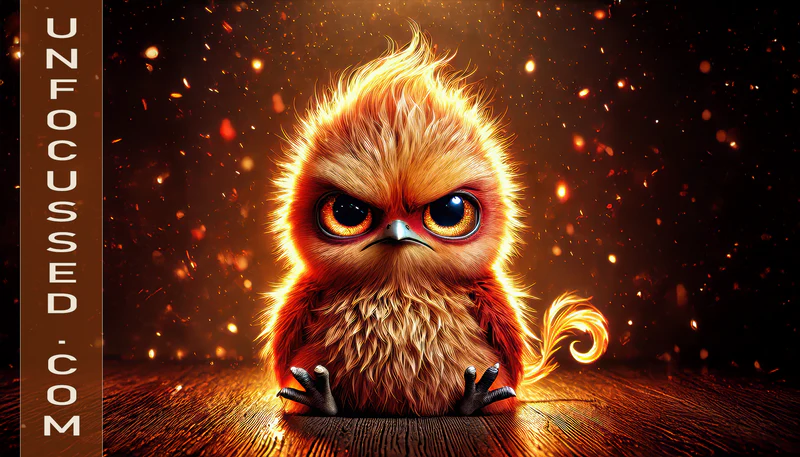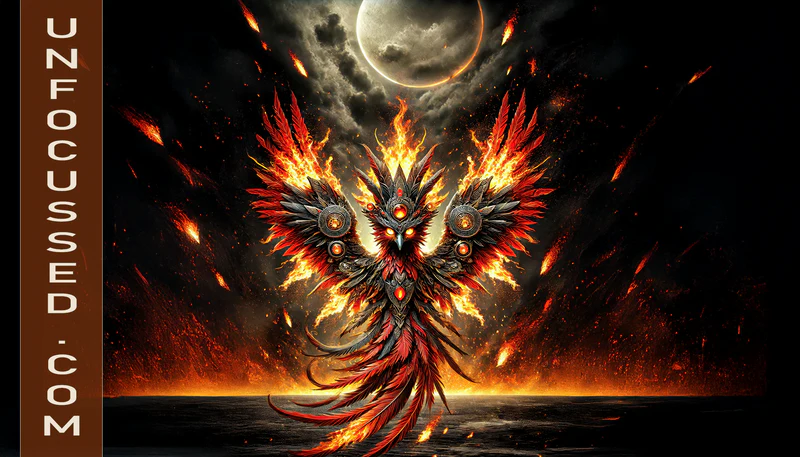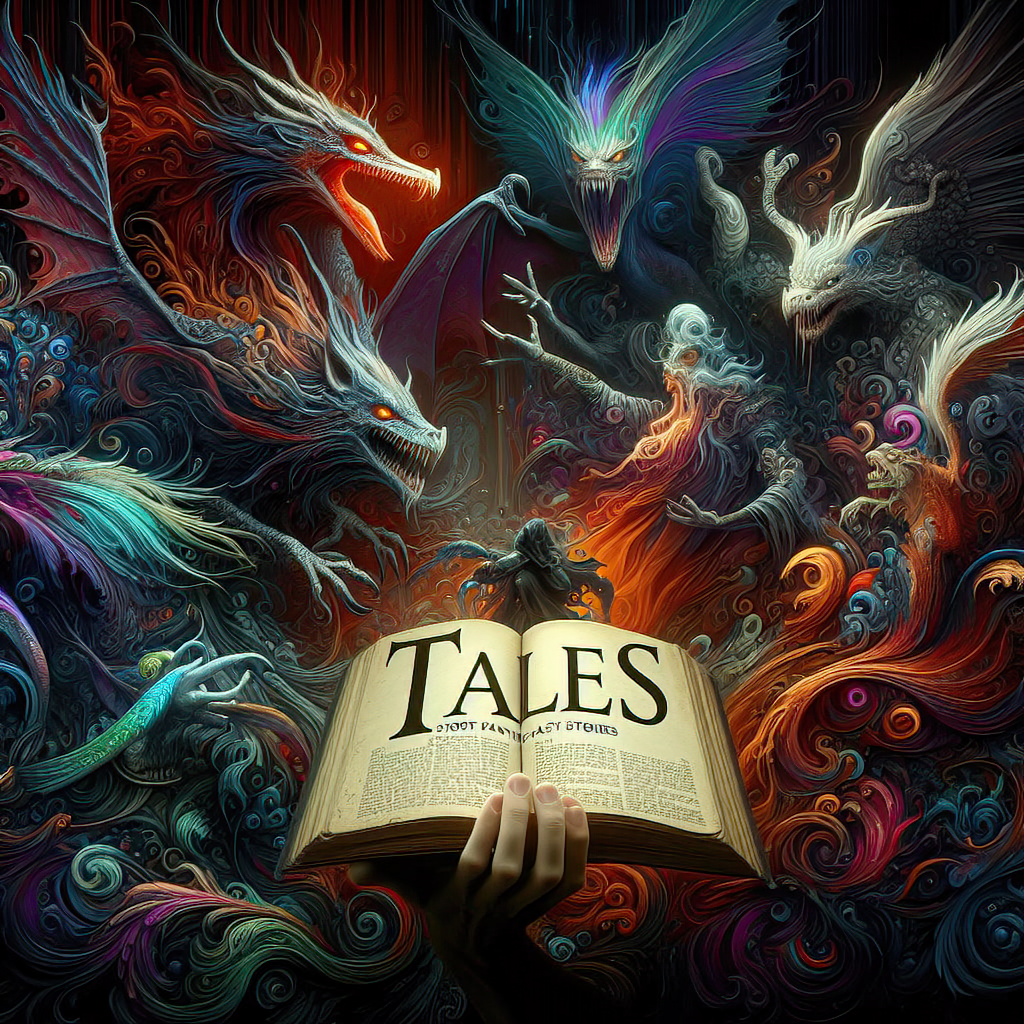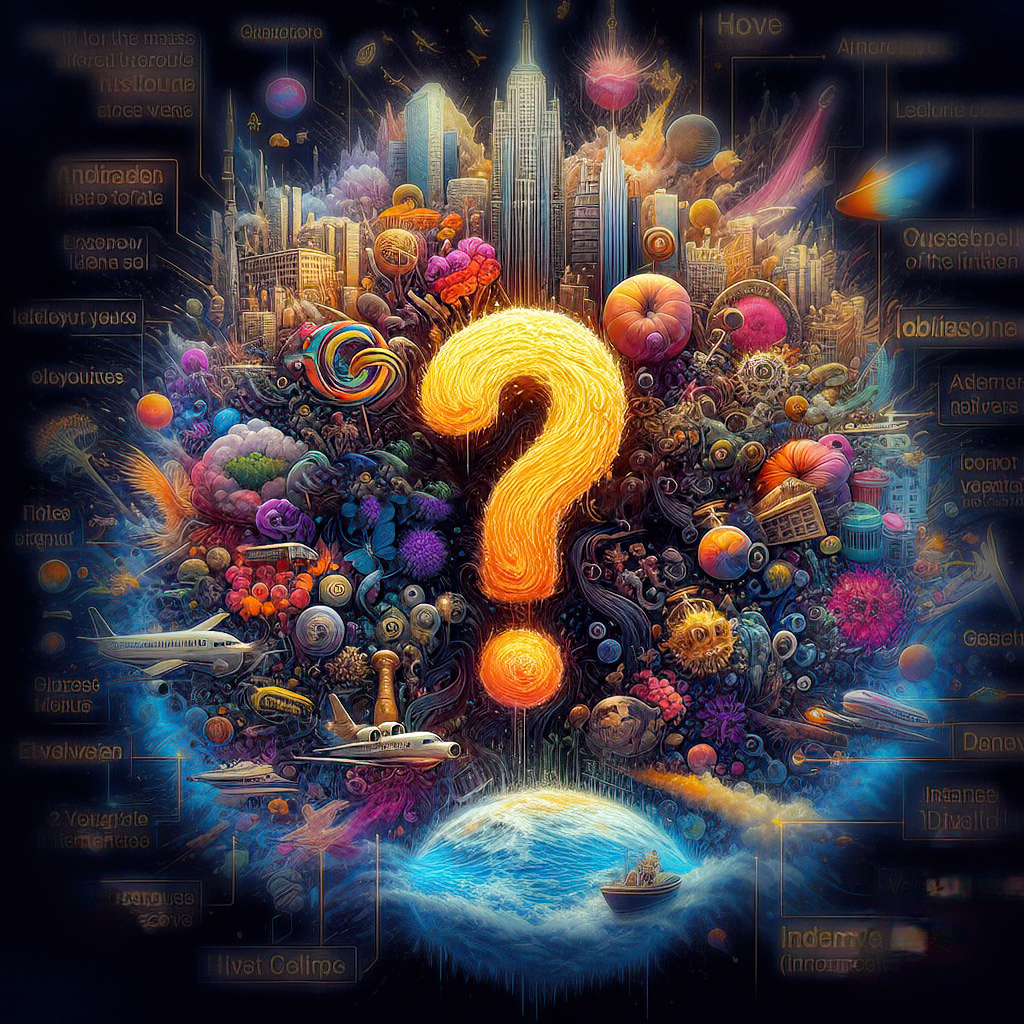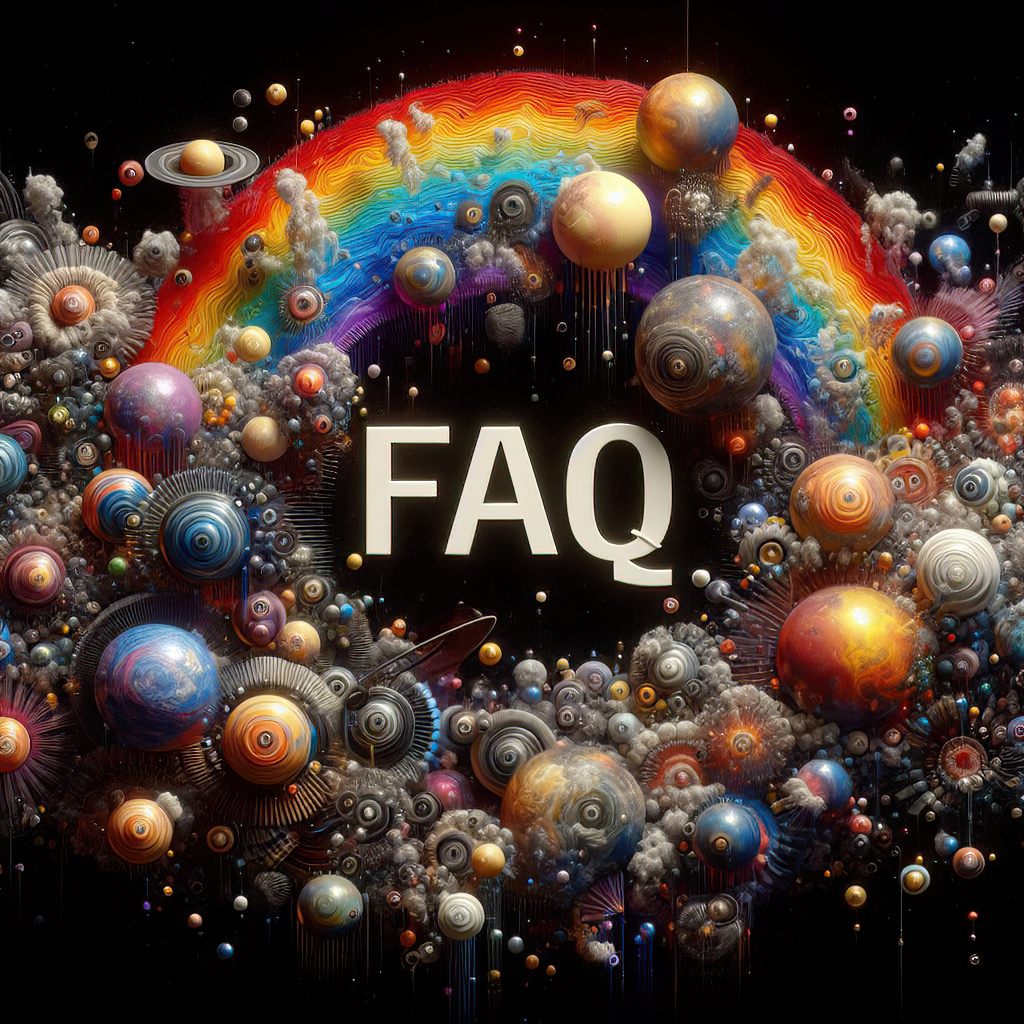
por Bill Tiepelman
Stormcaller of the Moonspire
The Roar Before Thunder The villagers of Draumheim had long whispered of the being that lived beyond the reach of men. Above the black pine forests and across the Glacier Pass, beyond the howling winds and shifting skies, there stood a jagged peak crowned in eternal snow. Children called it Moonspire. Hunters dared not name it at all. For they knew — or rather, their bones remembered — the legend of the Stormcaller. It was said to be born of three mothers: one a lioness who roared lightning into being, one a dragoness with wings woven of gold and memory, and one a stag spirit who vanished with the last sunrise of the First Age. From them came the creature now seen only when the sky cracked open — a luminous beast of fur and fang, crowned with antlers that summoned storms, its wings humming with forgotten runes. It was older than the kingdom. Perhaps older than gods. Once every blood moon, the sky turned electric. The high winds curled like serpents around the Moonspire, and on that night, the Stormcaller would rise from the cloudline and sit upon the edge of the world. Watching. Waiting. And when it roared, the mountain cracked below it. But the old magic was breaking. South of the peaks, at the edge of the Ebon Empire, the high king's obsession with conquest had birthed something unnatural. A sorcerer-general known as Ashkhar the Hollow had unearthed an artifact of fire — a crystal that could swallow storms. Bound by ambition, Ashkhar sought to control the sky itself, to enslave lightning, to render the gods obsolete. His warlocks warned him of the Moonspire. Of the creature. Of its oath to protect the balance between man and the storm. Ashkhar listened. And then, in the way of all power-drunk men, he laughed. Now, with the War of Aether near and a crystal engine spinning in the heart of the empire’s dreadnoughts, the veil between worlds began to thin. Lightning no longer danced freely. Storms seemed to cower, stuttering on the horizon like wounded beasts. Crops dried. Forests moaned. Something ancient was being strangled. And far above, at the highest reaches of Moonspire, the Stormcaller stirred for the first time in an age. Its claws raked ice from stone. Electricity hissed along its antlers. Its wings unfurled with the slow, dreadful grace of a forgotten god stretching after a long, cold dream. The runes along its veins shimmered orange, flickering with warning — not to man, but to the sky itself. The Stormcaller had seen empires rise and fall. But this time… they had dared to silence the storm. And for that, there would be reckoning. Skyfire and Bone The Stormcaller did not descend immediately. It crouched at the edge of the Moonspire for three days and three nights, unmoving, staring across a world that had forgotten how to listen to thunder. Its breath fogged the sky. Its claws etched glowing sigils into the ancient ice. Somewhere in the black silence of its chest, the heart of a tempest began to drum — slow, steady, ancient. The gods of the high air trembled, their slumbering domains rustling like leaves in warning. On the fourth morning, the sky split. The dreadnoughts came first — seven black leviathans of steel and spellglass, sailing on sorcery above the Ebon Empire’s northern frontier. Carried beneath them were the Skyspike Engines: weaponized lightning cages fueled by the storm-swallowing crystal Ashkhar had awakened from the Undervault. These machines could rip open a thunderhead and devour it whole. What once danced freely in the clouds now choked inside brass cylinders, bleeding magic into infernal turbines. Ashkhar, armored in obsidian and crowned with fire, stood upon the prow of the lead dreadnought. His voice, amplified by rune-binders, echoed across the peaks. “Show yourself, spirit. Bow, and you may yet serve the empire.” Far above, the Stormcaller blinked — a slow, amber glow behind the frost of its lashes. Bow? It did not know the word. It leapt. The descent was a scream through frozen air. Wings spread wide, the runes across them burning bright blue as the beast tore the wind in half. It didn’t need a battlecry. The very act of its flight was declaration. The mountain howled in its absence. They met above the lowlands. The first dreadnought had barely time to blink its crimson eyes before a bolt of raw, divine lightning struck through its core like a harpoon from the stars. The vessel cracked open mid-air, vomiting flame, metal, and men into the clouds. Ashkhar snarled and raised the crystal, sending out a wave of inverse light — a pressure that peeled magic from the sky like skin from bone. The Stormcaller reeled, its antlers dimming for a heartbeat, the spell-fire chewing at the edges of its wings. The beast crashed into a cloudbank, vanishing for a breath. But the storm is not a single bolt. The storm is fury with memory. It rose again, claws bristling with sparks. It dove straight into the second dreadnought, not with spell or lightning — but with tooth and rage. Its fangs tore through the hull like parchment. The men inside never screamed. They were ash before breath. The ship collapsed inward, folding like a dying star, consumed by the fury of the old world awakened. Yet Ashkhar had prepared for this. He called forth the Hollow Choir — a dozen spectral assassins bound by ritual and silence. Cloaked in the skins of fallen angels, they danced through the air like wraiths. Their blades, carved from sorrow and powered by siphoned divinity, sliced toward the Stormcaller from all sides. The beast roared. Not in pain. In challenge. The sky answered. Clouds above exploded with light. A curtain of silver and blue fire descended from the heavens, obliterating three of the Hollow Choir in an instant. The rest weaved through it, screeching their soulless fury. One reached the Stormcaller’s flank, drove a blade deep into its shoulder — and was incinerated mid-thrust, consumed by a ward etched in solar fire long before the Empire had a name. Still, the blade stuck. Blood, like molten starlight, spilled across the clouds. The Stormcaller faltered mid-flight. The dreadnoughts circled like vultures. From within the lead vessel, Ashkhar screamed words not meant for mortal mouths. The crystal blazed red, and the sky inverted — color drained, sound warped, and the very gravity of the world bent inward. “Now,” he growled, “you will fall.” The Stormcaller’s body convulsed in mid-air. Its wings folded inward as if crushed by the weight of the command. The runes flickered. Lightning halted in its veins. And then — A sound. Not a roar. Not a thunderclap. Something deeper. A drumbeat. From deep within the belly of the world, a pulse of rhythm older than language surged up through the mountains and into the beast. A low, ancient beat — the drum of the First Storm. It called not just to the Stormcaller, but to the very fabric of the sky. Storms that had hidden in shame surged from the far corners of the world. Winds screamed. Oceans twisted. Fire fell sideways. The balance had been betrayed. Now it would be avenged. The Stormcaller opened its eyes. They glowed not amber — but white. Endless. Starfire wrapped around its horns. The rune-wings expanded. And then it spoke, not in words but in weather. In will. In fury. The sky broke open. One dreadnought shattered like glass, ejected into another, both swallowed by a vortex of violet flame. The remaining Hollow Choir evaporated, the god-blood that sustained them boiling in a single heartbeat. Ashkhar screamed and turned the crystal’s core inward, desperate to contain the surging power — but it was too late. The artifact could not devour what the sky had reclaimed. It shattered. So did he. The explosion lit the night like a false sun. When it cleared, there was no empire left in the sky — only falling sparks, and the Stormcaller, silhouetted against a world put right. Blood still fell from its shoulder, staining the snow clouds beneath. It did not land. It did not rest. It simply turned — and flew back toward the Moonspire, the runes along its wings pulsing in slow, silent fury. The balance had not been restored. But it had been defended. The Sky Remembers For seven nights after the fall of the Empire’s skyfleet, the world held its breath. The moons spun uneasily. Forests fell silent. The rivers reversed their flow for a day and a half, as if the world’s blood was unsure which way to pump. Even the deepfolk — those blind creatures that whispered through stone and lived where magma dreamed — closed their ancient eyes and waited. For none could say what would happen when a creature like the Stormcaller roared not in threat... but in judgment. Yet there was no second strike. The Stormcaller did not return to finish the world. It did not descend into kingdoms or strike down rulers or write its law in lightning across the sky. Instead, it returned to Moonspire and vanished into a cloudbank. There were no footprints. No den. Only silence. And a faint scent of ozone on the winds that spiraled endlessly around the peak. But the changes had already taken root. Without Ashkhar’s crystal matrix, the Storm Engines sputtered and died. Across the continents, empires that had grown drunk on skyfire technology found themselves crippled. Airships plummeted. Warfronts dissolved. Borders unraveled like tired seams. The tide of conquest receded, not in flames, but in confusion — as if the earth had nudged mankind back into the mud from which it had risen. In Draumheim, the villagers awoke to skies that breathed again. Thunder rolled softly over the hills, no longer weaponized, no longer caged. Rain returned — real rain, not the manufactured drizzle of cloudcutters. Fields bloomed with a ferocity unseen in generations. Wolves returned to the high forest. Bears sang strange songs in their sleep. And then came the stories. At first, they trickled in like rumors. A shepherd near the foothills who claimed the lightning had spoken to her in dreams. A child who drew the creature with perfect accuracy, despite having never left his village. A blind widow who stood for three days under the open sky and whispered, “He’s watching still.” The monks of the Windway Abbey, once scholars of astral mapping and weather prophecy, claimed the constellations had shifted. That a new star now blinked above Moonspire — faint, blue, and rhythmic, like a heartbeat. The Order of the Chain — what remained of Ashkhar’s loyalists — attempted a final, desperate ritual to bind what they called “The Skygod.” They brought twelve crystal blades, nine bound scribes, and a library’s worth of forgotten names. They reached the summit on the winter solstice. None returned. Only a single rune remained, scorched into the peak beside the last campfire. It read: "You may climb the mountain. But the sky does not kneel." And so the Stormcaller became myth again. Bards told a thousand versions — some called it vengeance, others mercy. Some claimed the beast was dead, that the blood it lost in the battle was its last. Others said it had merely gone to sleep again, dreaming of the world that once danced with storms rather than enslaving them. A few — madmen and poets — whispered it was never a creature at all, but the will of the sky given flesh only when needed. Years passed. Then decades. The world changed, subtly. Architects stopped building towers that scraped the clouds. Kings stopped calling themselves gods. Sailors left offerings on their masts for fair winds, and children learned to mimic thunder when scared — not to frighten monsters away, but to ask for protection. And every now and then — when the moon hung low and stormclouds gathered over the mountains — someone would claim to see a silhouette perched on the edge of the world. Wings etched in rune-light. Antlers humming with power. Eyes like molten dusk. Just watching. For the Stormcaller did not destroy the world of men. It reminded them. That the sky is not a resource. It is not a frontier. It is not a thing to be broken and bottled and bought. It is alive. And it remembers. Bring the Stormcaller Home If the legend of the Stormcaller stirred something in your bones — that quiet thrill of awe, power, and wonder — you can now bring its presence into your space. This epic image is available as a museum-quality canvas print, an enchanting tapestry for your sacred wall, a cozy fleece blanket to weather your own winter nights, or a bold throw pillow for your throne. Each item features the electrifying detail and mythical majesty of “Stormcaller of the Moonspire,” making it more than art — it’s a reminder that some storms should never be silenced.




